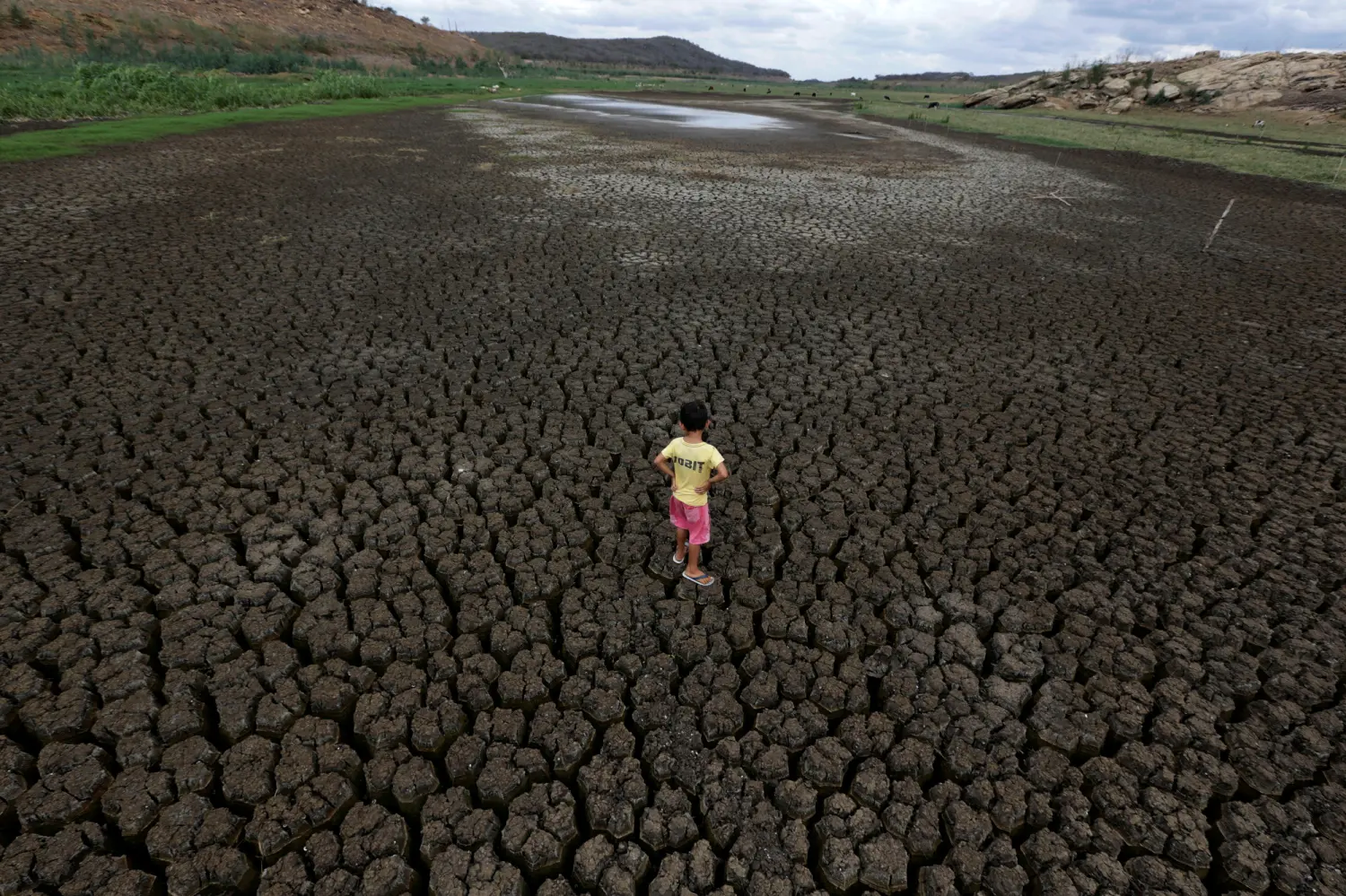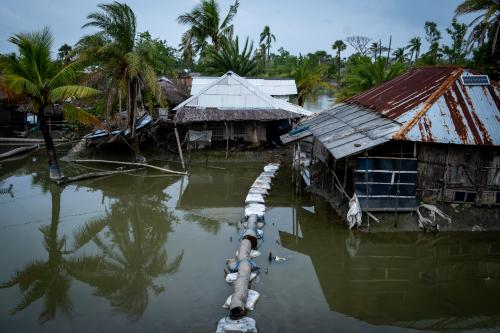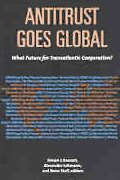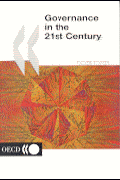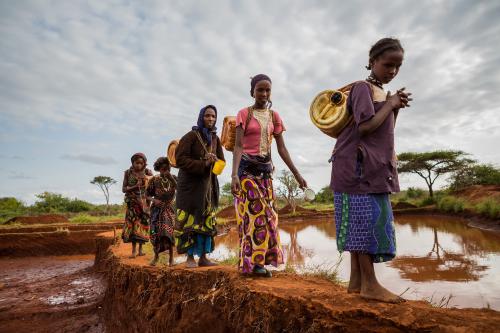The following is one of eight briefs commissioned for the 16th annual Brookings Blum Roundtable, “2020 and beyond: Maintaining the bipartisan narrative on US global development.”
On March 14, 2019, Tropical Cyclone Idai struck the southeast coast of Mozambique. The U.N. High Commissioner for Refugees reported that 1.85 million people needed assistance. 146,000 people were internally displaced, and Mozambique scrambled to house them in 155 temporary sites.1 The cyclone and subsequent flooding damaged 100,000 homes, destroyed 1 million acres of crops, and demolished $1 billion worth of infrastructure.2
One historic storm in one place over the course of one day. While Cyclone Idai was the worst storm in Mozambique’s history, the world is looking towards a future where these “unprecedented” storms are commonplace. This global challenge has and will continue to create a multitude of critical issues that the international community must confront, including:
- Large-scale human migration due to resource scarcity, increased frequency of extreme weather events, and other factors, particularly in the developing countries in the earth’s low latitudinal band
- Intensifying intra- and inter-state competition for food, water, and other resources, particularly in the Middle East and North Africa
- Increased frequency and severity of disease outbreaks
- Increased U.S. border stress due to the severe effects of climate change in parts of Central America
All of these challenges are serious, but the scope and scale of human migration due to climate change will test the limits of national and global governance as well as international cooperation.
The migration-climate nexus is real, but more scrutiny and action are required
In 2018, the World Bank estimated that three regions (Latin America, sub-Saharan Africa, and Southeast Asia) will generate 143 million more climate migrants by 2050.3 In 2017, 68.5 million people were forcibly displaced, more than at any point in human history. While it is difficult to estimate, approximately one-third of these (22.5 million4 to 24 million5 people) were forced to move by “sudden onset” weather events—flooding, forest fires after droughts, and intensified storms. While the remaining two-thirds of displacements are the results of other humanitarian crises, it is becoming obvious that climate change is contributing to so-called slow onset events such as desertification, sea-level rise, ocean acidification, air pollution, rain pattern shifts and loss of biodiversity.6 This deterioration will exacerbate many humanitarian crises and may lead to more people being on the move.
Multilateral institutions, development agencies, and international law must do far more to thoroughly examine the challenges of climate change (early efforts, like the World Bank’s 2010 World Development Report on climate change,7 had little uptake at a time when few thought a climate crisis was around the corner). Moreover, neither a multilateral strategy nor a legal framework exist to account for climate change as a driver of migration. Whether in terms of limited access to clean water, food scarcity, agricultural degradation, or violent conflict,8 climate change will intensify these challenges and be a significant push factor in human migration patterns.
To date, there are only a few cases where climate change is the sole factor prompting migration. The clearest examples are in the Pacific Islands. The sea level is rising at a rate of 12 millimeters per year in the western Pacific and has already submerged eight islands. Two more are on the brink of disappearing, prompting a wave of migration to larger countries.910 By 2100, it is estimated that 48 islands overall will be lost to the rising ocean.11 In 2015, the Teitota family applied for refugee status in New Zealand, fleeing the disappearing island nation of Kiribati.12 Their case, the first request for refuge explicitly attributed climate change, made it to the High Court of New Zealand but was ultimately dismissed. Islands in the Federated States of Micronesia have drastically reduced in size, washed down to an uninhabitable state, had their fresh water contaminated by the inflow of seawater, and disappeared in the past decade.13 Despite their extreme vulnerability, the relatively small population (2.3 million people spread across 11 countries14) and remote location of the Pacific Islands means that they garner little international action, for all the attention they receive in the media.
Although there are few instances of climate change as the sole factor in migration, climate change is widely recognized as a contributing and exacerbating factor in migration and in conflict.
In South Asia, increasing temperatures, sea level rise, more frequent cyclones, flooding of river systems fed by melting glaciers, and other extreme weather events are exacerbating current internal and international migration patterns. Additionally, rapid economic growth and urbanization are accelerating and magnifying the impact and drivers of climate change—the demand for energy is expected to grow 66 percent by 2040.15 Compounding this, many of the expanding urban areas are located in low-lying coastal areas, already threatened by sea level rise.16 The confluence of these factors leads the World Bank to predict that the collective South Asian economy (Bangladesh, Bhutan, India, the Maldives, Nepal, and Sri Lanka) will lose 1.8 percent of its annual GDP due to climate change by 2050.17 The New York Times reports that the living conditions of 800 million people could seriously diminish.18 Diminishing living conditions on this scale and intensity will prompt mass migration—possibly at an unprecedented level.
Northwest Africa is facing rising sea levels, drought, and desertification. These conditions will only add to the already substantial number of seasonal migrants and put added strain on the country of origin, as well as on destination countries and the routes migrants travel. The destabilizing effects of climate change should be of great concern to all those who seek security and stability in the region. Climate and security experts often cite the impacts of the extreme drought in Syria that preceded the 2011 civil war.19 The security community also highlights the connection between climate change and terrorism—for instance, the decline of agricultural and pastoral livelihoods has been linked to the effectiveness of financial recruiting strategies by al-Qaida.20
The intersection of climate change and migration requires new, nimble, and comprehensive solutions to the multidimensional challenges it creates. Accordingly, the signatories to the 2015 Paris Agreement on climate change requested that the Warsaw International Mechanism for Loss and Damage Associated with Climate Change (WIM) develop recommendations for addressing people displaced by climate change.21 Similarly, The Global Compact for Safe, Orderly, and Regular Migration (adopted by 164 countries—not including the U.S.—in Marrakech in December 2018) called on countries to make plans to prevent the need for climate-caused relocation and support those forced to relocate.22 However, these agreements are neither legally binding nor sufficiently developed to support climate migrants—particularly migrants from South Asia, Central America, Northwest Africa, and the Horn of Africa.
Time to envision legal recourse for climate refugees
As gradually worsening climate patterns and, even more so, severe weather events, prompt an increase in human mobility, people who choose to move will do so with little legal protection. The current system of international law is not equipped to protect climate migrants, as there are no legally binding agreements obliging countries to support climate migrants.
While climate migrants who flee unbearable conditions resemble refugees, the legal protections afforded to refugees do not extend to them. In the aftermath of World War II, the United Nations established a system to protect civilians who had been forced from their home countries by political violence. Today, there are almost 20.4 million officially designated refugees under the protection of the United Nations High Commission for Refugees (UNHCR)—however, there is an additional group of 21.5 million people23 who flee their homes as a result of sudden onset weather hazards every year.24
The UNHCR has thus far refused to grant these people refugee status, instead designating them as “environmental migrants,” in large part because it lacks the resources to address their needs. But with no organized effort to supervise the migrant population, these desperate individuals go where they can, not necessarily where they should. As their numbers grow, it will become increasingly difficult for the international community to ignore this challenge. As severe climate change displaces more people, the international community may be forced to either redefine “refugees” to include climate migrants or create a new legal category and accompanying institutional framework to protect climate migrants. However, opening that debate in the current political context would be fraught with difficulty. Currently, the nationalist, anti-immigrant, and xenophobic atmosphere in Europe and the U.S. would most likely lead to limiting refugee protections rather than expanding them.
The SDGs can help, but not without an update to the US response
While there are no legally binding international regimes that protect climate migrants, there are voluntary compacts that could be used to support them. Most notably, 193 countries adopted the 2030 Sustainable Development Goals (SDGs), which address both migration and climate change.
Several of the 169 targets established by the SDGs lay out general goals that could be used to protect climate migrants. SDG 13 on climate action outlines several targets that address the climate crisis:
- 13.1: Strengthen resilience and adaptive capacity to climate-related hazards and natural disasters in all countries
- 13.2: Integrate climate change measures into national policies, strategies, and planning
- 13.3: Improve education, awareness-raising and human and institutional capacity on climate change mitigation, adaptation, impact reduction, and early warning.
To meet these goals, extensive bilateral and multilateral development assistance will be needed. The U.S. must create a strategic approach to focus development assistance and multilateral organizations on those targets—particularly to create resilient societies that can keep people in their communities.
Although the SDGs do not explicitly link climate change and migration, SDG target 10.7 calls for signatories to “facilitate orderly, safe, and responsible migration of people, including through implementation of planned and well-managed policies.” Again, the United States should channel multilateral development assistance to support the implementation of this target.
The scale and scope of climate change demand dynamic and comprehensive solutions. The U.S. must address climate stress on vulnerable populations specifically, rather than funneling more money into existing programs that operate on the periphery of the growing crisis.
U.S. development agencies and international development financial institutions need to redirect their development assistance to incorporate today’s unfolding climate crisis. Significantly more resources will need to be channeled to the new U.S. International Development Finance Corporation (USDFC), USAID, the Green Climate Fund, UNHCR, as well as to other critical international bodies, in particular those that make up the International Red Cross and Red Crescent organizations.
The Obama administration undertook myriad efforts to update the institutions that can address climate. Several of President Obama’s executive orders, particularly Executive Order 13677, which required incorporating climate resilience into decisionmaking on development assistance, took on the climate crisis. For the first time in the Department of Defense’s history, the 2010 Quadrennial Defense Review (QDR) recognized climate change as a “threat multiplier,” with the potential to exacerbate current challenges.25
While the current administration has deemphasized or opposed climate-friendly approaches, the current security implications of the migration crisis might prompt a re-examination of those policies. There should be bipartisan support, particularly in the security community, for reducing the conditions that accelerate international migration.
The case for scaling up US action to confront the climate crisis
A variety of medium-term investments (five to 10 years) could create more resilience to the effects of climate change. For example, the climate change factors that push migration in Northwest Africa could—at least in part—be addressed by supporting irrigation infrastructure, providing food supplies, fostering regional water cooperation, and supporting livelihood security.26
Dedicating greater resources to mitigate climate migration is also part of an effective solution. Research is needed to determine the best way to improve the migratory process itself—be it increasing migration monitors, providing safer modes of transport, and consolidating and expanding destination country integration resources.
This discussion is not new: In 2010, Center for American Progress staff were part of a task force that suggested a “Unified Security Budget” for the United States, to address complex crisis scenarios that transcend the traditional division of labor among defense, diplomacy, and development.27 The need for longer-term, more calculated assessment strategies and investments has only increased over the past decade. The Pentagon already supports a variety of operational missions that respond to sudden onset climate disasters. The Navy, in particular, serves at the emergency hotline for international extreme weather events and mobilized to support the Haitian people after the 2010 earthquake, the Filipino people after the 2013 typhoon, and the Nepalis after the 2015 earthquake.
Alternatively, creating a single dedicated fund (by drawing funds from Operations and Maintenance, Research and Development, and the Refugee Assistance Fund) would allow the United States to streamline and refine its support strategies, address the effects of climate change directly, and rebuild its reputation abroad. Such a dedicated fund should try to emulate and partner with the United Kingdom’s Department for International Development (DFID), Germany’s Society for International Cooperation (GIZ), and Japan’s International Cooperation Agency (JICA). American seed funding in this area could lead to major investments of allies and partners—and in cooperation with the development agencies of these countries can mobilize massive resources at the scale required to confront the global climate crisis.
The strategies to address climate migrants presented here are far reaching, but this crisis will only intensify, and our response to it will define international relations in the 21st century.
-
Footnotes
- United Nations. “UNHCR Factsheet: Cyclone Idai.” May 2019.
- Reid, Kathryn “2019 Cyclone Idai.” World Vision. April 26. 2019. https://www.worldvision.org/disaster-relief-news-stories/2019-cyclone-idai-facts
- Kumari Rigaud, Kanta, Alex de Sherbinin, Bryan Jones, Jonas Bergmann, Viviane Clement, Kayly Ober, Jacob Schewe, Susana Adamo, Brent McCusker, Silke Heuser, and Amelia Midgley. 2018. Groundswell: Preparing for Internal Climate Migration. The World Bank. Pg 2. https://openknowledge.worldbank.org/handle/10986/29461
- McDonnell, Tim. “The Refugees the World Barely Pays Attention To.” June 20, 2018. https://www.npr.org/sections/goatsandsoda/2018/06/20/621782275/the-refugees-that-the-world-barely-pays-attention-to.
- The Nansen Initiative. “Disaster-Induced Cross-Border Displacement.” December 2015. Page 6. https://nanseninitiative.org/wp-content/uploads/2015/02/PROTECTION-AGENDA-VOLUME-1.pdf
- “Slow Onset Events.” United Nations Framework Convention on Climate Change. https://unfccc.int/process/bodies/constituted-bodies/executive-committee-of-the-warsaw-international-mechanism-for-loss-and-damage-wim-excom/areas-of-work/slow-onset-events
- “World Development Report 2010: Development and Climate Change.” World Bank. 2010. https://openknowledge.worldbank.org/handle/10986/4387
- “How Climate Change Can Fuel Wars.” The Economist. May 23, 2019. https://www.economist.com/international/2019/05/25/how-climate-change-can-fuel-wars
- Nunn, P.D., Kohler, A. & Kumar, R. “Identifying and Assessing Evidence for Recent Shoreline Change Attributable To Uncommonly Rapid Sea-Level Rise in Pohnpei, Federated State of Micronesia, Northwest Pacific Ocean.” Journal of Coast Conservation (2017) 21: 719. https://doi.org/10.1007/s11852-017-0531-7
- Roy, Eleanor Ainge, and Sean Gallagher. “One day we’ll Disappear: Tuvalu’s Sinking Islands” The Guardian. May 16, 2019. https://www.theguardian.com/global-development/2019/may/16/one-day-disappear-tuvalu-sinking-islands-rising-seas-climate-change
- Deshmukh, Amrita. “Disappearing Island Nations Are The Sinking Reality of Climate Change.” Qrius. May 17, 2019. https://qrius.com/disappearing-island-nations-are-the-sinking-reality-of-climate-change/
- “New Zealand: Climate Change Refugee Case Overview.” Law Library of Congress. July 29, 2015. https://www.loc.gov/law/help/climate-change-refugee/new-zealand.php
- Nunn, Patrick D., Augustine Kohler, and Roselyn Kumar. “Identifying and Assessing Evidence For Recent Shoreline Change Attributable To Uncommonly Rapid Sea-Level Rise in Pohnpei, Federated States of Micronesia, Northwest Pacific Ocean.” SpringerLink, July 13, 2017. https://link.springer.com/article/10.1007%2Fs11852-017-0531-7
- “The World Bank in Pacific Islands.” World Bank. April 8, 2019. https://www.worldbank.org/en/country/pacificislands/overview
- Prakash, Amit. “Boiling Point.” Finance and Development, September 2018, Vol. 55. No. 3. International Monetary Fund. https://www.imf.org/external/pubs/ft/fandd/2018/09/southeast-asia-climate-change-and-greenhouse-gas-emissions-prakash.htm
- Nansen Initiative Secretariat. “Climate Change, Disasters, and Human Mobility is South Asia and Indian Ocean: Background Paper.” April 5, 2015. Pg 11.
- “Climate Change Danger to South Asia’s Economy.” United Nations Framework Convention on Climate Change. August 19, 2014. https://unfccc.int/news/climate-change-danger-to-south-asias-economy
- Sengupta, Somini, and Nadja Popovich. “Global Warming in South Asia: 800 Million at Risk.” The New York Times. June 28, 2018. https://www.nytimes.com/interactive/2018/06/28/climate/india-pakistan-warming-hotspots.html
- Gleick, Peter. “Water, Drought, Climate Change, and Conflict in Syria.” Pacific Institute of Oakland California. July 1, 2014. https://journals.ametsoc.org/doi/full/10.1175/WCAS-D-13-00059.1
- Werz, Michael, and Laura Conley. “Climate Change, Migration, and Conflict in Northwest Africa.” Center for American Progress. April 2012. Pg 8.
- United Nations Human Rights Council. “The Slow Onset Effects of Climate Change and Human Rights Protection for Cross-Border Migrants.” March 23, 2018. Pg 10.
- Specifically, articles 18.H (share information to better map and predict migration based on climate change and environmental degradation), 18.I (develop adaptation and resilience strategies that prioritize the country of origin), 18.J (factor in human displacement in disaster preparedness strategies), and 18.K (support climate-displaced persons at the sub-regional and regional levels). United Nations. “Global Compact for Safe, Orderly and Regular Migration: Intergovernmentally Negotiated and Agreed Outcomes. July 13, 2018. https://refugeesmigrants.un.org/sites/default/files/180713_agreed_outcome_global_compact_for_migration.pdf
- United Nations. “Global Trends: Forced Displacement in 2018.” June 20, 2019 UNHCR. www.unhcr.org/en-us/statistics/unhcrstats/5d08d7ee7/unhcr-global-trends-2018.html
- United Nations. “Frequently asked questions on climate change and disaster displacement.” November 6, 2016. UNHCR. https://www.unhcr.org/en-us/news/latest/2016/11/581f52dc4/frequently-asked-questions-climate-change-disaster-displacement.html
- Department of Defense. “Quadrennial Defense Review Report” February 2010. Pages 84-89. https://history.defense.gov/Portals/70/Documents/quadrennial/QDR2010.pdf?ver=2014-08-24-144223-573
- Werz, Michael, and Laura Conley. “Climate Change, Migration, and Conflict in Northwest Africa.” Center for American Progress. April 2012. Pg 3.
- Pemberton, Miriam, and Lawrence Korb. “Report of the Task Force on A Unified security Budget for the United States.” Institute for Policy Studies. August 2010. https://fpif.org/wp-content/uploads/2010/08/USB_FY2011.pdf

